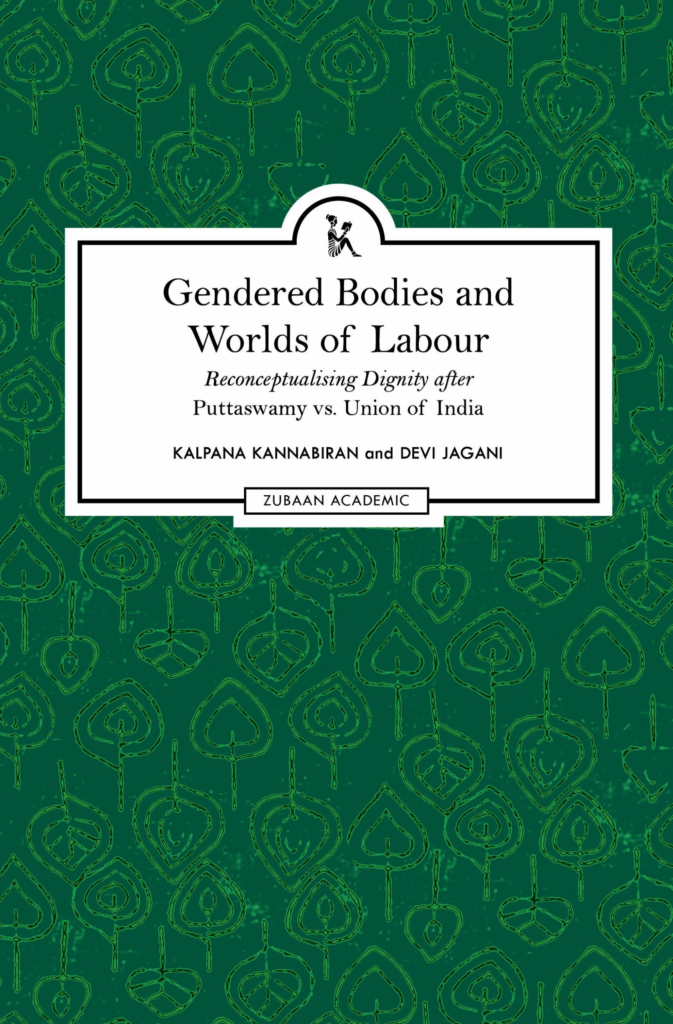
In Gendered Bodies and Worlds of Labour: Re-Conceptualising Dignity After Puttaswamy vs. Union of India (published by Zubaan in 2024), Kalpana Kannabiran and Devi Jagani achieve what the ambitious title suggests: a multidisciplinary synthesis as well as a precise theoretical argument. Best read as an offspring of Kannabiran’s 2021 book co-authored with Swethaa S Ballakrishnen, Gendered Regimes and the Politics of Privacy: A Feminist Re-Reading of Puttaswamy vs. Union of India, the 2024 monograph builds on the arguments using Puttaswamy – the 2017 Supreme Court case that established the right to privacy rooted in dignity – as its point of departure. It makes a crucial interdisciplinary intervention: introducing the normative power of Indian constitutional law to the literature on gendered work.
In the first three chapters, the authors draw on critical literature from various traditions (feminist, anti-caste, queer, anti-capitalist, disability rights) and commit to a materialist and intersectional understanding of equality. They recognise dignity as a “conditioning environment for rights talk.” They introduce key concepts, including the gendered expectations of “private, domestic” work from women and its embodied impacts on both women and others within the family structure. Although there is a commitment to a “critical” approach to the use of constitutional language in the context of “collective struggles,” the book primarily harnesses (and thereby potentially reinstates) the discursive power of the Supreme Court and the legal text of the Constitution, with passing references to the struggles and alternative sources of constitutional discourse. Further, they do so knowing the limitations of relying on a contradictory corpus of judgments, particularly with the ushering in of neoliberalism. For instance, an opinion by socialist judge Krishna Iyer cited that the public ownership of natural resources would have little practical consequence today. However, the authors argue that Puttaswamy offers an opportunity to move in the right direction. These arguments culminate in a careful analysis of manual scavenging as an exemplar of these problems, illustrating the co-constitutive nature of caste and gender in sustaining undignified labour practices contrary to constitutional values.
Chapter 4 addresses “sex” and other grounds in Indian equality law. The authors argue that the Supreme Court decisions in NALSA (which legally recognised transgender people) and Navtej (which decriminalised homosexual intercourse) recognised “gender identity” and “sexual orientation” as analogous grounds. This approach expands the understanding of “woman” as a coalition subjugated by caste-patriarchy and allows for intersectional and non-binary framings. The authors critique the separate framework of anti-discrimination and harassment for transgender people under the Trans Act, arguing that it produces the harms of a “separate but equal” logic: it hinders feminist solidarity and risks excluding transgender people from other general labour and equality frameworks, such as sexual harassment and domestic violence laws. The chapter explores the gendered nature of labour performed by jogappas, a trans community often pushed into manual labour, begging, and sex work, exacerbating the legislative precariousness of trans-queer workers. While the book uses the phrase “cis-women-trans-queer” workers (itself clunky with its separation of “cis-women”) throughout to commit to a gender-plural approach, it pays limited attention to trans-queer workers’ particularities and solidarities outside this chapter, where the binary literature on domestic work is often extended uncritically. This gap may reflect the dearth of empirical and theoretical work on trans-queer experiences in India.
The authors then discuss transgressions, including rights claims, as acts of normative evolution. Problematising “consent” in sex work, they argue that while the world is ‘devoid of choice,’ women retain some agency ‘between eating and going hungry’ that must be respected. Considering the framing of all women outside heterosexist marriage as “prostitutes”/transgressors, the authors extend their analysis to judicial discourse that assumes women agree to perform domestic work when they enter marriage: what they identify as the ‘doctrine of implied consent.’ This is replicated in the opinion of Justice Shanker, who upheld the marital rape exception. Specifically, the reasoning conflates the ‘legitimate expectation’ of conjugal relations within marriage to a ‘legal right.’
This critique of consent/choice deftly reveals the connections between patriarchal logic across the continuum of sexual abuse, sex work, wage work, housework, and care work. Simultaneously, it raises doubts about what Puttaswamy’s liberal conception of autonomy can achieve. Drawing from the South African case of Mahlangu, the authors argue for a “contextual approach.” Mahlangu recognised a violation of dignity in excluding domestic workers from receiving workplace injury compensation, based on a racialised and feminised undervaluation of their work, revealing a transformative potential. The authors turn to Justice Shakhder’s opinion striking down the marital rape exception, which they argue shows the potential for this radical contextual approach in India. Recognising the sexual autonomy of women, he declares marital rape incompatible with marriage as “between equals,” which amounts to a rejection of the doctrine of implied consent. Justice Shakhder also recognises that sexual violence particularly affects women’s reproductive care and responsibilities.
In the final substantive chapter, the authors consider limitations on the right to privacy. They caution against judicial paternalism and argue for a high standard when applying the test of proportionality. Although the book leaves some loose ends – its opening gambit sets up a broad synthesis of multiple fields but whittles down to legal-doctrinal arguments on specific issues – as a short but ambitious monograph, it successfully reorients constitutional normativity towards the concerns of women and queer workers, opening the field for further engagement.
***
Mihir Rajamane is an incoming PhD candidate in Socio-Legal Studies at the University of Oxford and currently finishing an LLM at King’s College London with a focus on Law and the Social Sciences. His main research interests are in queer and feminist studies, sociology of law and in material approaches to law.
